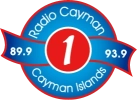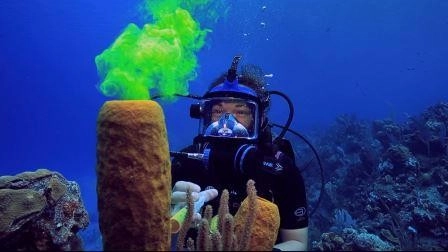CCMI Extends Digital and Live Resources to Provide Engaging Activities During Lock Down
CCMI Extends Digital and Live Resources to Provide Engaging Activities During Lock Down
The Central Caribbean Marine Institute (CCMI) has further developed it’s digital programming, including Reefs Go Live and the Reef Lecture series, so people at home (at any age) can tune in to learn more about local reefs and the research news from the CCMI team. During this time of global lock-down, the team at CCMI felt it was important to increase their outreach activity, to help break the boredom and give people something positive to think about, as well as learning more about coral reefs.
Reefs Go Live is in its 3rd year and usually the team livestreams from under the ocean in Little Cayman, directly to students in classes. CCMI has developed a series of mini-modules that launched on the 27th March, using beautiful ocean footage from previous broadcasts, presented by an educator who is live, answering questions in real time as they come in via Youtube chat. The next broadcast is on the 3rd April at 9:30am (-5UTC) and will be on the topic of “Why Do We Need Coral Nurseries” via their Youtube channel youtube.com/ccmireefresearch. Whilst the content is aimed at primary students, anyone can join us and is relevant to a range of people, around the world. The session run last week had thousands of viewers from a multitude of countries. The complete Reefs Go Live resources are also readily available on the CCMI website https://reefresearch.org/what-we-do/education/reefs-go-live/, including all the underwater broadcasts and activity sheets, perfect for homeschooling (for all ages).
March and April are also usually a busy part of CCMI’s outreach season and the Reef Lecture Series has been a staple for Grand Cayman residents since 2018. The team will take the series online, so people can join the lecture live, digitally but whilst this service is being produced, people can find all the previous lectures online at https://reefresearch.org/get-involved/events-outreach/reef-lecture-series/.
CCMI Director of Advancement, Kate Holden, says CCMI feels it’s important to show solidarity during the current global crisis:
“The team at CCMI have worked hard to turn around a number of free, readily available digital resources. Digital media is already part of our portfolio but we are looking at how we can increase this activity for the next few months. CCMI’s President, Dr. Carrie Manfrino and the education and communications team, have produced a new set of Reefs Go Live Mini modules and we are looking at how we can keep in touch with our stakeholders around the world, creating live connections, at a time when positive interaction is so important”.
In this time of physical distancing, the CCMI team thought people may also be looking for something to keep active and moving – while also helping support coral reefs. Even in these challenging times with the coronavirus, coral reefs are still under threat, CCMI is continuing critical work to unlock the secrets of coral resiliency in the face of changing environmental conditions. Those who wish to support this work can do their part by joining the Reef Relief Squad and take part in this special virtual challenge. It’s not limited to residents of the Cayman Islands, either; anyone from any location can register and complete activities in an effort to virtually travel the distance between all of the Cayman Islands (total distance of 180 mi/290 km)! Starting on 8th April, participants are asked to get active and log their walking, running, swimming and cycling miles, seeing how far they can go by the end of the challenge on World Oceans Day (8th June). While putting in miles, whether outside or inside, CCMI encourages participants to take pictures of their efforts and post them in the designated Three Island Virtual Challenge Facebook group, sharing their progress with other participants from around the world. There is a small registration fee, which will support coral reef research and details can be found here: https://reefresearch.org/get-involved/events-outreach/3-island-virtual-challenge/
CCMI will continue to deliver free programming and resources during this time of uncertainty, any queries should be sent to info@reefresearch.org/
Latest News
-
Man Arrested Following Attempted RobberyPolice/Cou...12 December 2025, 02:00 PM
-
RCIPS Formally Announces the Commencement of Operation Winter GuardianPolice/Cou...12 December 2025, 01:59 PM
-
IMAC Elects 2026 Executive CommitteeBusiness12 December 2025, 01:57 PM
-
Cayman Delegation Participates in 61st CFATF Plenary in BarbadosGovernment12 December 2025, 01:56 PM
-
CIS opens applications for Caymanian Citizenship Scholarship Programme for 2026-2027.Education12 December 2025, 01:55 PM


